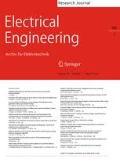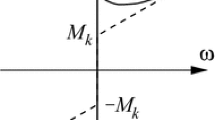Abstract
Identification of systems operating in closed loop has been of primary concern in many industrial applications and scientific research for the last few decades. Control engineering has been one of the major fields of application of system identification in closed loop. DC motors are widely used in control systems as actuating elements or parts of the plant to be controlled. Major nonlinearities affecting the behavior of a motor and its load take effect especially at low speeds and during reversal of direction. The purpose of the current contribution is to present a nonlinear direct approach to the identification of a DC motor with load in closed loop, and show that the suggested nonlinear direct approach significantly reduces the error caused by the nonlinear effects at certain time intervals. The nonlinear model was built utilizing a Hammerstein system structure. The linear approach and the suggested nonlinear approach are tested via real time experiments and results are graphically presented. The accuracy of the suggested method is also revealed by graphics and tabulated data.














Similar content being viewed by others
References
Landau ID (1999) From robust control to adaptive control. Control Eng Prac 7:1113–1124
Forssell U, Ljung L (1999) Closed-loop identification revisited. Automatica 35:1215–1241
Söderström T, Stoica P (1989) System identification. Prentice Hall, Cambridge, UK
Horng JH (1999) Neural adaptive tracking control of a DC motor. Information Sci 118:1–13
Lyshevski SE (1999) Nonlinear control of mechatronic systems with permanent-magnet DC motors. Mechatronics 9:539–552
Yavin Y, Kemp PD (2000) Modeling and control of the motion of a rolling disk: effect of the motor dynamics on the dynamical model. Comput Meth Appl Mech Eng 188:613–624
Mummadi VC (2000) Steady-state and dynamic performance analysis of PV supplied DC motors fed from intermediate power converter. Solar Energy Mater Solar Cells 61:365–381
Jang JO, Jeon GJ (2000) A parallel neuro-controller for DC motors containing nonlinear friction. Neurocomputing 30:233–248
Nordin M, Gutman P (2002) Controlling mechanical systems with backlash—a survey. Automatica 38:1633–1649
Wu R-H, Tung P-C (2002) Studies of stick-slip friction, presliding displacement, and hunting. J Dyn Syst 124:111–117
Ogata K (1990) Modern control engineering. Prentice Hall, Englewood Cliffs, NJ
Slotine E, Li W (1991) Applied nonlinear control. Prentice Hall, Englewood Cliffs, NJ
Lee PL (1993) Nonlinear process control: applications of generic model control. Springer, Berlin Heidelberg New York
Lischinsky P, Canudas-de-Wit C, Morel G (1999) Friction compensation for an industrial hydraulic robot. IEEE Contr Syst Mag 19:25–32
Khalil HK (2002) Nonlinear systems. Prentice Hall, Upper Saddle River, NJ
Liu GP, Daley S (2000) Optimal-tuning nonlinear PID control of hydraulic systems. Control Eng Pract 8:1045–1053
Sun Y-J, Hsien Y-C, Hsieh J-G (1997) A unifying control scheme of linear circuits with saturating or dead-zone actuator. J Franklin Inst 334:427–430
Wang J, Pu J, Moore P (1999) A practical control strategy for servo-pneumatic actuator systems. Control Eng Pract 7:1483–1488
Zongli L (1997) Robust semi-global stabilization of linear systems with imperfect actuators. Syst Control Lett 29:215–221
Ljung L (1999) System identification: theory for the user. Prentice Hall, Englewood Cliffs, NJ
Hsia TC (1977) System identification. DC Heath, Lexington, MA
Hasiewicz Z (1999) Hammerstein system identification by the Haar multiresolution approximation. Int J Adapt Control 13:691–717
Sun L, Liu W, Sano A (1999) Identification of a dynamical system with input nonlinearity. IEE Proc Control Theory Appl 146:41–51
Kara T, Eker İ (2002) Identification of nonlinear systems for feedback control. In: Proceedings of the 4th GAP Engineering Congress. Literatur Press, Istanbul. vol. 1, pp 520–526
Chen YY, Jackson DA (2000) An empirical study on estimators for linear regression analyses in fisheries and ecology. Fish Res 49:193–206
Faber MN (1999) Estimating the uncertainty in estimates of root mean square error of prediction: application to determining the size of an adequate test set in multivariate calibration. Chemometr Intel Lab 49:79–89
Wan ATK, Ohtani K (2000) Minimum mean-squared error estimation in linear regression with an inequality constraint. J Stat Plan Infer 86:157–173
Author information
Authors and Affiliations
Corresponding author
Rights and permissions
About this article
Cite this article
Kara, T., Eker, İ. Nonlinear closed-loop direct identification of a DC motor with load for low speed two-directional operation. Electr Eng 86, 87–96 (2004). https://doi.org/10.1007/s00202-003-0189-z
Received:
Accepted:
Published:
Issue Date:
DOI: https://doi.org/10.1007/s00202-003-0189-z




